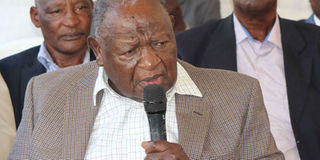State to blame for Matiba’s health condition

Kenneth Matiba demanded a return to democracy in Kenya. He died in Nairobi on April 15, 2018. PHOTO | FILE | NATION MEDIA GROUP
What you need to know:
- When I was elected the Law Society of Kenya chairman in 1990, Ken and I worked closely with others in what came to be dubbed the “second” liberation.
When he was arrested and detained in the run up to Saba Saba, I visited him a number of times as his lawyer.
Ken realised he had suffered a stroke as soon as it happened.
I have known Mr Kenneth Matiba for many years. At the beginning as a client in the mid-70s when I acted for him in a libel suit arising from the Kenya Football Federation elections and in later years both as a friend and a client.
Following the infamous 1988 Mlolongo elections, I teamed up with Bill Deverell as his lawyer in an election petition filed against him.
When he resigned from the Cabinet following rigging of the party elections, which were followed by the presidential and parliamentary elections of 1988, I drafted his resignation letter.
SECOND LIBERATION
When I was elected the Law Society of Kenya chairman in 1990, Ken and I worked closely with others in what came to be dubbed the “second” liberation.
I accompanied him to Nyayo House to deliver the request for a permit from the then Nairobi Provincial Commissioner to hold the Saba Saba (July 7, 1990) rally at Kamukunji. He had accepted my legal advice that constitutional freedom of assembly was distinct from freedom of association, so that the restriction of the latter by reason of the provisions of Section 2A which made Kenya a one-party State, did not bar the freedom of assembly.
When he was arrested and detained in the run up to Saba Saba, I visited him a number of times as his lawyer. I went to see him at Naivasha Maximum Prison, Shimo la Tewa Prison, Kilifi and several times at the then Nairobi Areas Police Headquarters opposite Nairobi Club.
DETENTION
The other person who visited him from time to time was Dr Jim Nesbitt who was Ken’s physician even before his detention. I remember as clearly as if it happened yesterday the conversation I had with Dr Nesbitt one morning in my office around October in 1990 after he had been to see Ken the previous evening.
That morning, I found Dr Nesbitt waiting for me in my secretary’s office. Dr Nesbitt’s office was on the third floor of Electricity House while mine was on the sixth floor of the same building. Dr Nesbitt looked worried, concerned. He told me: “Paul, I never discuss my patients with my wife Mary, but last night, I couldn’t but discuss your client’s condition with my wife.”
He then narrated to me Ken’s worrying condition. He told me before detention, Ken had mild hypertension which was under control because he exercised and took prescription drugs from time to time.
DRUGS
Dr Nesbitt told me that from the first time he had been allowed to see Ken in detention, end of July or early August 1990, he wanted to give him drugs for the hypertension, but that he had been prevented from doing so by security agents and the government doctor – a doctor Mwongera.
Dr Nesbitt was on each occasion informed that the government was responsible for providing any necessary drugs to Ken. Dr Nesbitt told me how on several occasions he had tried to reason with the government doctor. He even offered to show the government doctor the packet of drugs he had taken to Ken, which was “unopened” if his fear was untoward drugs being given to Ken, but he refused. Yet, the government never made drugs available to Ken. His condition continued to rapidly deteriorate. And it was because of this Dr Nesbitt asked me to do whatever I could to save the situation.
Dr Nesbitt’s last words stuck in my mind: “If nothing is done, at best, Ken is going to suffer a stroke, at worst, he is going to die.”
AMNESTY INTERNATIONAL
I sent a fax to Amnesty International pleading for their intervention.
Less than two months after my conversation with Dr Nesbitt, Ken suffered a stroke in the middle of the night in solitary confinement at Kamiti Maximum Prison. When eventually Ken was admitted to Nairobi Hospital, I was able to get the details from him.
Ken realised he had suffered a stroke as soon as it happened. He knocked loudly on his cell door, requested the two guards who went into his cell to each hold him under the armpit and walk him around the cell for the remainder of the night to keep blood circulating. In the morning when the government doctor came, he prescribed pain killers.
TREATMENT
A couple of days went by as officials argued on where he was to be treated. Forces Memorial Hospital, the government’s preferred facility, said they lacked the equipment and expertise to handle stroke cases and their patients are usually transferred to Kenyatta National Hospital. There was a further delay because, of course, retired President Moi had the last word over the matter.
I have no doubt that Ken’s stroke was deliberately induced by the government by denying him drugs to contain his hypertension and refusal to have his doctor take the medicine to him. In my view, the government was fully responsible for Ken’s situation and its consequences.
Mr Muite is a senior counsel





